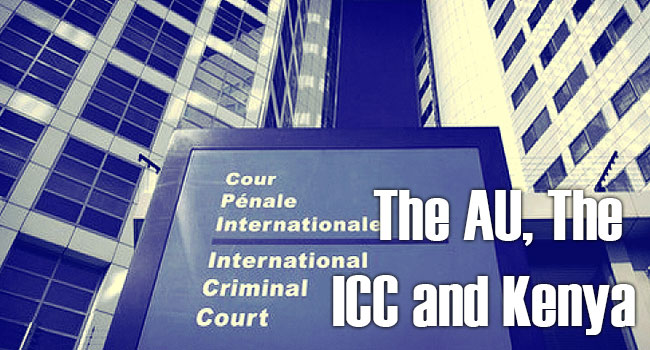The AU, ICC and Kenya

The African Union (AU), formerly the Organization of African Union (OAU) was formed on the 9th September 1999 when the Heads of State and Government of the Organization of African Unity issued a Declaration (the Sirte Declaration) calling for the establishment of an African Union. This was with a view, inter alia, to accelerate the process of integration in the Continent to enable it play its rightful role in the global economy while addressing multifaceted social, economic and political problems compounded as they are by certain negative aspects of globalisation. One other main aim of the formation of the Organisation of African Unity was also motivated by the need to rid Africa of the remaining vestiges of colonization and apartheid.
The Organization of African Union was aimed at sending a message to the world, particularly to former colonizers, that Africans were taking charge of not only their countries but also their Continent. African countries aimed at coordinating and intensifying cooperation for development; to safeguard the sovereignty and territorial integrity of Member States and to promote International cooperation within the framework of the United Nations.
The OAU initiatives paved the way for the birth of AU. In July 1999, the Assembly decided to convene an extraordinary session to expedite the process of economic and political integration in the Continent. Hence the birth of the African Union which was created to promote African unity and boost the social, economic and political attributes of the African States.
Kenya being a member of the African Union, Africa's interest in the ongoing cases at the ICC is rather obvious considering the Continent's need to try and safeguard the sovereignty of member states.
The Kenyan cases in the ICC have raised a lot of public interest not only within Kenya but also regionally within Africa and in the International Community. They are critical because they involve the President and Deputy President. There have been several legal, social, political and economic issues that have risen from this case, which is the first of its kind against serving heads of state. Several questions have been raised and in particular there has been fear of a power vacuum that could be created if both heads of state were to be in trial at the same time. The AU leaders, including South Africa's Jacob Zuma, warned that Kenya would collapse if its President and Deputy President were to be out of the country at the same time for the full duration of their trials at The Hague. This issue has however been averted.
A motion was tabled in Parliament to have Kenya as a State to withdraw from the Rome Statute; which is a treaty that established the International Criminal Court (ICC). This was and still is an extremely contentious issue as it is contrary to Articles 2(5) and 2(6) of the Constitution which declared or established Kenya as a Monist state. In regards to withdrawing Kenya from the Rome statute, some critics have termed the move as a dangerous one which would set bad precedent for other states and particularly other African states. The Motion was however passed by the Kenyan Parliament.
The African Union, in its bid to fight for the member states, recently petitioned the International Criminal Court to drop the cases against President Kenyatta and his Deputy Ruto citing among other things discrimination from the International Criminal Court on Africans countries. The allegations were followed with a threat claiming that if nothing was done about the said cases then there would be a massive pull out from the Rome Statute by all African States. It is important to note that African countries account for 34 of the 122 parties that have ratified the Rome Statute which founded the ICC and therefore their withdrawal is of a big significance to the institution.


